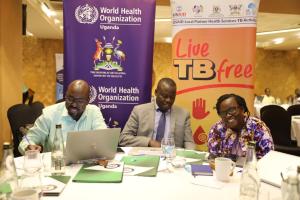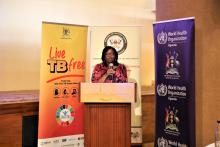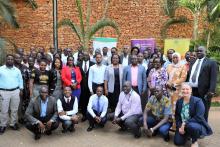WHO supports the development of Uganda’s TB and Leprosy strategic plan
Kampala. The Ministry of Health, with support from the World Health Organization (WHO) and key partners has kickstarted the development of Uganda’s next five-year Strategic Plan for Tuberculosis (TB) and Leprosy (2025/26–2029/30). A key milestone in this process was the National Strategic Plan development workshop held this week in Kampala, which brought together stakeholders from across the health sector and beyond to shape the future of TB and leprosy control in Uganda.
Uganda continues to face a high TB burden, with an estimated 96,000 new cases reported annually. Approximately 15% of these cases occur in children under 14 years. Although the country achieved leprosy elimination status two decades ago, recent years have seen a gradual resurgence, with an average of 300 cases reported annually.
The workshop served as a platform for inclusive dialogue, evidence review, and strategic alignment. It emphasized the importance of data-driven decision-making, stakeholder engagement, and coordinated investment to accelerate progress toward ending TB and achieving zero leprosy by 2030.
“The development of this new strategic plan marks a pivotal shift from reactive disease control to proactive, precision-driven public health programming. This is our opportunity to embed resilience into the system and ensure that every intervention is both evidence-based and context-specific,” said Dr Stavia Turyahabwe, Commissioner Communicable Disease Prevention and Control, Ministry of Health. “By leveraging real-time surveillance data, and stakeholder insights, we aim to ensure that our TB and leprosy response is more adaptive, equitable, and impact-oriented.”
Building on this momentum, WHO continues to work closely with Uganda’s Ministry of Health, providing technical support, expertise, and innovative solutions. This partnership is key to ensuring that the country not only meets international health standards but also addresses local needs in the fight against TB and Leprosy.
“Let us seize this opportunity to align our vision, coordinate investments, and accelerate progress toward Ending TB in Uganda by 2030—in line with the Sustainable Development Goals and WHO’s End TB Strategy,” added Dr Christine Chiedza Musanhu, WHO Uganda Country Office Universal Health Coverage (Communicable and Non-Communicable diseases) Cluster Lead. “ We envision a future where every individual-regardless of geography, income, gender, or age, has access to high-quality, people-centred TB care.”
The four-day Uganda TB National Strategic Plan Development Workshop was supported by WHO, the CDC Foundation and METS.
As Uganda charts a new course in the fight against TB and leprosy, the development of this strategic plan is a reaffirmation of the country’s commitment to health equity, innovation, and resilience.


